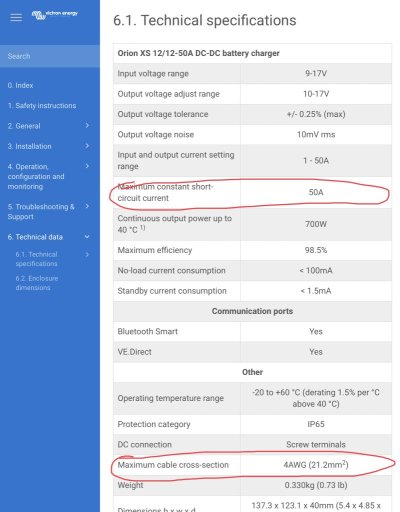dhays
Guru
- Joined
- May 26, 2015
- Messages
- 9,574
- Location
- Gig Harbor, WA
- Vessel Name
- Kinship
- Vessel Make
- 2010 North Pacific 43
I am starting to plan the installation of the DC-DC charger, hopefully this weekend. Victron is confusing me however.
In Victron's installation instructions they mention cable size for the input and output wire three times.
- if you use 8, 6, or 4 AWG wire, you don't need to use ferrules to connect the wire to the input/output screw terminals. If you use thinner wire, then a ferrule can be used.
- Recommend a 60-70amp fuse. If cable run is 5-10m, then use 4 AWG wire. If cable is <5m then 6 AWG wire is recommended.
- Torque settings for the screw terminal connections are given for 4, 6, 8, 10, 12 AWG wire.
I want to use maxi blade fuse holders for the fuses. I am having some trouble sourcing good quality 6 AWG Fuse holders. Easy to find 8 AWG fuse holders. The wire runs will be less than 2 feet to Bus bars which are connected to the batteries and the ground with 4/0 cable. So can I use 8 AWG wire for this or should I keep trying to hunt down 6 AWG fuse holders?
In Victron's installation instructions they mention cable size for the input and output wire three times.
- if you use 8, 6, or 4 AWG wire, you don't need to use ferrules to connect the wire to the input/output screw terminals. If you use thinner wire, then a ferrule can be used.
- Recommend a 60-70amp fuse. If cable run is 5-10m, then use 4 AWG wire. If cable is <5m then 6 AWG wire is recommended.
- Torque settings for the screw terminal connections are given for 4, 6, 8, 10, 12 AWG wire.
I want to use maxi blade fuse holders for the fuses. I am having some trouble sourcing good quality 6 AWG Fuse holders. Easy to find 8 AWG fuse holders. The wire runs will be less than 2 feet to Bus bars which are connected to the batteries and the ground with 4/0 cable. So can I use 8 AWG wire for this or should I keep trying to hunt down 6 AWG fuse holders?

